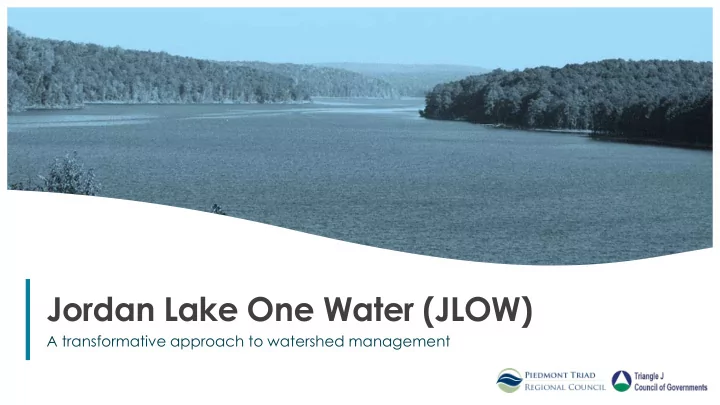

Jordan Lake One Water (JLOW) A transformative approach to watershed management 1
Collaboration in the Jordan Lake Watershed Historically Contention has led to a lack of • communication on a watershed scale Entities are predominantly “going it alone” • Spending large amounts of money for small • nutrient reductions Recognized Need for Alternative Approach 2 2
Shifting the Paradigm What is One Water? "One Water is an integrated planning and implementation approach to managing finite water resources for long-term resilience and reliability, meeting both community and ecosystem needs." - Water Research Foundation Similar to Integrated Watershed Management • (IWM) A One Water approach can take many different forms, but has some unifying characteristics: A mindset that all water has value • A focus on achieving multiple benefits - economic, • environmental, & social Approaches decisions with a systems mindset • Utilizes watershed-scale thinking & action • Relies heavily on partnerships & inclusion • 3 3
Benefits of a One Water Approach in the Jordan Lake Watershed Enables us to solve regional watershed issues that are generally beyond the capacity of any one stakeholder by: • Leveraging knowledge, resources, and experience • Increasing access to funds and funding opportunities • Building partnerships and trust • Sharing responsibility and understanding • Establishing greater credibility • Recognizing collective goals and triple bottom line benefits 4 4
History of JLOW Around the same time - TJCOG began discussions NCDOT received NCDEQ with local stakeholders Since That Time support to investigate a One about regional Water strategy for stormwater management of Jordan Held 7 large group • nutrient management Lake watershed stakeholder meetings Summer Held 7 elected officials • meetings 2016 2017 Formed advisory committee • Begun seeking funding for • administrative support Begun developing a work • Spring 2017 plan to guide efforts over 2017 the next year Continued outreach to • broaden stakeholder UNC Policy Collaboratory Held first meeting. Interest network begins research including in integrated watershed analysis of nutrient management was so high that management strategies quarterly meetings were planned. 5 5
6
Goals Utilizing communication, collaboration, and cooperation, JLOW seeks to: Solve regional watershed issues that are generally • beyond the capacity of any one stakeholder Draw on experience and leadership of elected • officials and other champions of the group Work closely with local and state regulators and • other policy groups in an advisory context Increase access to funds and funding opportunities • Establish and develop partnerships and trust • among stakeholders Leverage knowledge, resources, and experience • 7 7
Next Steps Upcoming Initiatives Finalize work plan • • Establish clear overarching goals, process, and timeline Develop a One Water management framework for the Jordan Lake Watershed • through diverse stakeholder participation • Will be forming workgroups to tackle certain topic areas Expand outreach & communication efforts to bring in missing stakeholders • • Would like to have representation from every community & perspective Participate in nutrient rule revision process • • Help DWR meet public participation requirements Other Potential Projects Generate a 'catalog' of One Water case studies • Build inventory/clearinghouse of policies/programs & projects in watershed • Publish a One Water guidance document for the watershed • Identify & execute pilot projects • 8 8
Questions? For more information, please visit our website at: http://www.tjcog.org/jordan-lake-one-water.aspx 9
THANK YOU Cameron Colvin Water Resources Planner ccolvin@ptrc.org 10
Recommend
More recommend